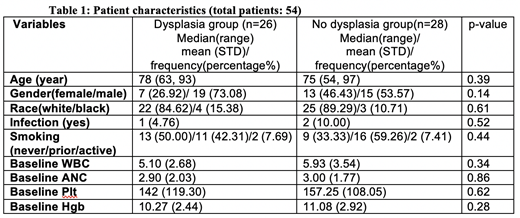Abstract
Introduction
Clonal cytopenia of undetermined significance (CCUS) represents a clonal group of cells with the presence of a hematologic malignancy-associated somatic mutation without meeting the morphologic criteria for MDS. CCUS patients have a variable risk of progression to MDS. The WHO requires at least 10% of a cell lineage have dysplastic morphology for the diagnosis of MDS, but CCUS patients have been described with no evidence of dysplasia (CCUS-ND) or with low level dysplasia (CCUS-D). We previously identified CCUS-D as biologically distinct with higher risk MDS mutations. We hypothesized that CCUS-D would be independently associated with the risk of progressive cytopenia over time and thus may have clinical relevance in the setting of CCUS.
Methods
Cases of CCUS were identified on review of bone marrow biopsies completed for the diagnosis of cytopenia from 8/2016 to 9/2018 with results of a custom 31-gene NGS hotspot panel to detect mutations in the following genes: ASXL1, BRAF, CALR, CBL, CSF3R, DNMT3A, ETV6, EZH2, FLT3, GATA2, IDH1, IDH2, JAK2, JAK3, KIT, KRAS, MPL, MYD88, NPM1, NRAS, PHF6, PTPN11, RUNX1, SETBP1, SF3B1, SRSF2, TET2, TP53, U2AF1, WT1, and ZRSR2. The classification of CCUS-D or CCUS-ND required two or more board-certified hematopathologists to score the degree of morphologic dysplasia on bone marrow aspirates with at least one of the following morphologic criteria: >2%-<10% erythroid precursors with nuclear irregularities, >50% erythroid cells with megaloblastoid changes and/or basophilic stippling, >5%-<10% hypogranular and/or hypolobated granulocytes, or ≥10% megakaryocytes that were small and hypolobated or showed other nuclear abnormalities such as grape-like nuclei. We recorded baseline characteristics including cytogenetics, results of next-generation sequencing, and lab findings and then followed patients with annual blood counts.
Statistical differences of baseline characteristics were evaluated by T-test for continuous variables, and Chi-square / Fisher's exact test were used for association between categorical variables. The repeated measures over time for various outcomes (WBC, ANC, hemoglobin, platelet) were visualized using scatter plot supervised with lowess smoother. The effects of dysplasia on various longitudinal outcomes were estimated using linear mixed-effect models.
Results
We identified 54 CCUS patients on review of 200 marrows completed for undiagnosed cytopenia. Twenty-six patients were identified with CCUS-D, and 28 patients with CCUS-ND. Baseline clinical characteristics including age, gender, race, smoking status, or presence of infection at time of initial diagnosis were similar. Hematology laboratory parameters including White Blood Cell Count (WBC), Absolute Neutrophil Count (ANC), Hemoglobin (Hgb), and Platelet Count (Plts) did not differ. (Table 1). Patients with CCUS-D had an average of 1.62 mutated genes detected per patient with the most common being TET2 (26.19%), SRSF2 (14.29%), and DNMT3A (14.29%). Patients with CCUS-ND had an average of 1.41 mutations per patient with the most common being TET2 (31.57%) and DNMT3A (31.57%).
Patients were followed for a median of 32.2 months and a range from 1.0 to 48.8 months. On long term follow up, WBC, ANC, Hgb and plts trended lower in patients with CCUS-D compared to CCUS-ND, but the difference was marginally statistically significant (p = 0.09, 0.16, 0.13, 0.64 respectively). We also evaluated the rate of change in hematology parameters and found no significant difference in change rate of WBC, ANC, and hgb (p = 0.25, 0.13, and 0.28, respectively). There was a significant difference in the change rate of platelet counts between the two groups (p = 0.026). In particular, patients with CCUS-D had decreasing platelet counts at a rate of -0.04119 10E9/L/day and patients with CCUS-ND had increasing platelet counts at a rate of 0.01075 10E9/L/day.
Two patients in the CCUS-D cohort progressed to MDS at an average of 938.5 days. One patient with CCUS-ND progressed to Large Granular Lymphocytic Leukemia at 805 days.
Conclusions
Low level (< 10%) dysplasia in cell lineages in CCUS is associated with a higher rate of decline in platelet counts but was not independently associated with increased risk of progressive neutropenia, leukopenia, or anemia. Longer follow up may be required to further understand the clinical significance of low level dysplasia in CCUS.
No relevant conflicts of interest to declare.


This feature is available to Subscribers Only
Sign In or Create an Account Close Modal